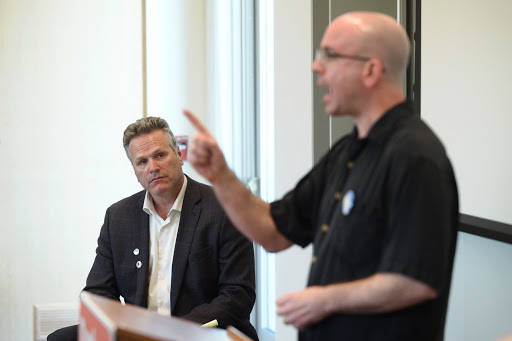Restaurants, hairdressers, nail salons and other retail businesses will be allowed to open their doors Friday, but whether they’re able to is another matter.
With all the conditions placed by state mandate on reopening, some businesses won’t be able to start serving customers for some time, if at all.
Businesses that want to reopen have to follow a number of strict health guidelines including social distancing, wearing personal protective equipment and providing sanitation stations for customers.
“I think the biggest factor is when we can get all the PPE, I’m guessing it’s going to be at least a week,” said Kimmy Jensen, owner of Rejuvenation Salon & Spa.
Jensen said she had mixed feelings about the reopening, torn between dueling concerns over health and wanting to provide for her employees.
“I want my staff to be safe and healthy, and I want them to have a job. I want them to have both but both are in jeopardy,” she said.
Jensen was waiting on the Alaska Board of Barbers and Hairdressers to have a meeting to help provide guidance. That group is scheduled to have a meeting Friday morning according to the Department of Commerce, Community, and Economic Development.”
In his original proclamation, the governor included a provision that stated state mandates superseded any stricter local regulations.
“Conflicting local provisions will frustrate this Mandate’s health and economic objectives and, therefore, are irreconcilable with this Mandate’s purposes,” the governor said in health mandate 16. “Business operation and other activities permitted to operate under this mandate may not be prohibited by local, municipal, or tribal mandate, directive, resolution, ordinance, regulation or other order.”
Several city leaders who spoke to the Empire expressed concern at the governor’s decision. However, in the final version of the mandate that was published online, the controversial order was removed.
This came as a surprise to city officials.
“He amended the mandate without telling anybody,” said Robert Palmer III, municipal attorney for the City and Borough of Juneau. Palmer said he had spent his day doing work related to that section of the mandate before learning it had been rescinded.
“The state has the constitutional authority to oversee the pandemic, but we don’t want communities to feel that the heavy hand of the state is going to be there,” Dunleavy said Thursday evening. “The purpose is for us to constantly work together.”
City leaders said they mostly agreed with the governor’s intent to open up the state and the way he was going about it, but that they were concerned that he was moving to fast.
“We were a little surprised that it’s (Friday) morning,” said City Manager Rorie Watt. Following the governor’s Wednesday announcement, the Juneau Assembly called an emergency meeting for Thursday and asked representatives from the state to be there.
“The governor’s mandates say his mandates supersedes local control, so I think we’re going to have a lot of questions about do we have the local authority,” Watt said.
According to Watt, the state was making available Department of Health and Social Services Commissioner Adam Crum and Sarah Hargrave, Southeast Alaska regional nurse manager for the Alaska Public Health Association to answer questions for the Assembly.
Watt said he wanted to know how the state was going to monitor Juneau and communicate with the city. Communication between state agencies and local municipalities was mentioned by other Assembly members, including Michelle Bonnet Hale, who complained there hadn’t been enough guidance coming from DHSS.
What guidance has been coming from DHSS, “it’s like a moving target,” Hale said. “Why don’t have someone from DHSS saying you’re information is looking good and this is why.”
The state has maintained it has the ability to monitor and respond to a potential resurgence in COVID-19 cases in the state. Chief Medical Officer Dr. Anne Zink has said previously Alaska’s hunker down period allowed the state to build up its health care capacity.
But even though they’re allowed to reopen, that doesn’t mean that more than a few businesses will, according to Assembly member Wade Bryson.
“There’s no right way to reopen the economy after a global pandemic,” Bryson said. “Just because the governor’s allowing a little less restrictions that does not mean that all retail is going open.”
Bryson also owns both of Juneau’s Subway restaurants. With all the restrictions, Bryson’s restaurants still won’t be able to open to their full capacity, he said, particularly the downtown branch.
“We’ve wiped out the downtown customer base,” Bryson said. “I think taking the slowest, most cautious step when reopening the economy; someone needed to do it.”

